|
 |
 |
 |
 |
|
|
Star Trek
25th Anniversary |
 |
| Footprinting Ceremony held on Thursday, December 5, 1991 |
| |
Star Trek VI: The Undiscovered Country Opened Nationwide on Friday, December 6, 1991, on 1,804 screens.
|
| |
With the release of the sixth Star Trek feature film, the Star Trek fraternity had been saddened by the passing of the show's creator, Gene Roddenberry just a few months before in October.
Originally aired over the NBC network in September of 1966, Star Trek was wildly popular with a certain segment of the television-watching public. NBC did not agree, and cancelled the show after three seasons and 73 episodes.
With the success of George Lucas' Star Wars franchise, Paramount re-united the crew of the USS Enterprise and released Star Trek: The Motion Picture (which played the Chinese in December 1979), followed by three more films before launching a new ship and crew operating within the Star Trek world: Star Trek: The Next Generation, for 176 episodes airing in syndication, beginning in September 1987. Two more features with the original Star Trek cast were made before Roddenberry passed away. His creation continues to make its way into our imaginations still. |
|
|
|
|
| |
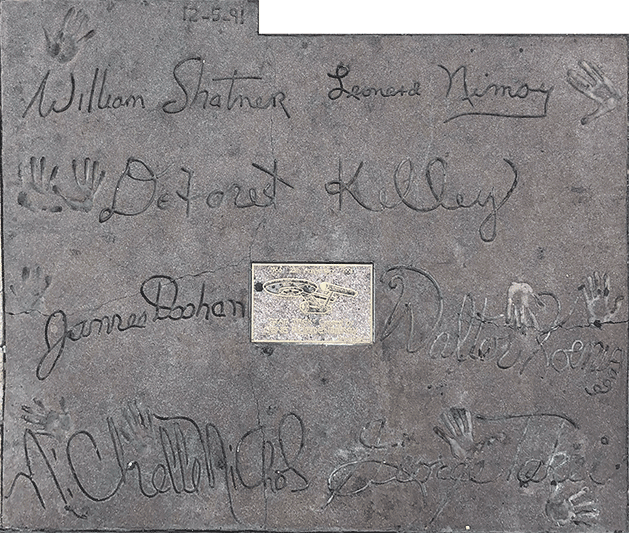 |
 |
| Mann's Chinese Theatre, Hollywoold, California. Star Trek 25th Annivesary Forecourt block. Executed by unknown, Thursday, December 5, 1991. 85 x 72 inches overall. |
 |
|
 |
| |
|
|
|
|
| DeForest Kelley |
| |
Born: Jackson DeForest Kelley, January 20, 1920, in Toccoa, Georgia
Age at the time of the ceremony: 71
Died: June 11, 1999, in Woodland Hills, California, age 79
|
| |
Named after electronic pioneer Lee De Forest by his Baptist minister father, young DeForest began to learn to play music and sing in his father's church services, which led to his singing on the radio and in movie theatres. During high school years, DeForest worked in the local movie theatre and played football and baseball.
During World War II, Kelley was assigned to the Army Air Force First Motion Picture Unit, working out of Long Beach California. Wanting to remain in LA and getting into the movie business, DeForest worked to save up the money to make the move after leaving the service in 1946. In the low-budget noir, Fear in the Night (released in April 1947), Kelley got second-billing under Paul Kelly (who?), and while the film was popular, Kelley and his wife Carolyn, moved to New York. He found work in television, but moved back to Los Angeles.
Director Fred Zinnemann cast him as one of the numerous doctors in The Men (released in August 1950), with Marlon Brando. During his many appearances on television, he always played doctors, cops, lawyers or weirdos. For example, he played a doctor on The Lone Ranger, aired over ABC in June 1953; his turn in Gunsmoke, aired over CBS in March 1956, is appropriately hysterical — he gets bumped off early. He guested nine times on the history anthology show You Are There, aired over CBS from September 1953 (where he played Everton Conger), to September 1956.
Ocassionally, DeForest would get a part in a movie. He played brother Morgan to Burt Lancaster's Wyatt Earp in Gunfight at the O.K. Corral (released in May 1957); he has a bit part as a Confederate soldier in Raintree County (released in December 1957), with Montgomery Clift and Elizabeth Taylor.
He guested on
Rawhide, aired over CBS in February 1959, and he appeared in several episodes of Trackdown, aired over CBS beginning in November 1957, and Mike Hammer, aired in syndication in 1959.
Kelley actually had the lead in an episode of
Alcoa Theatre over NBC in June 1960. He played a lawyer defending a capital crime in a story called 333 Montgomery : it was written by Gene Roddenberry, who wanted to turn it into a television show, but it did not happen.
So back to guest starring parts in all sorts of television what-not. Kelley
guested a couple times on Lawman, aired over ABC in January 1961, he played a milktoast son-in-law on Perry Mason, aired over CBS in December 1961, Route 66 , aired over CBS in January 1962, Have Gun — Will Travel, aired over CBS in December 1962 and 77 Sunset Strip, aired over ABC in November 1963. He appeared on Bonanza, aired over CBS four times, in October 1961, in December 1962, and in a two-part episode in January 16, and January 23, 1966.
Finally, he was cast as Dr. Leonard "Bones" McCoy on Roddenberry's
Star Trek for all 76 episodes, aired over NBC from September 1966 to June 1969. The show gave Kelley a chance to dig deep into his character on the show, and although "Bones" is a bit of a humbug, you can't help liking the guy.
With Star Trek cancelled, Kelley went back to episodic television, appearing in such deathless classics as Ironside aired over NBC in March 1970, and Room 222, aired over ABC in December 1971. He did the voice of McCoy on Star Trek: The Animated Series for 22 episodes, airing over NBC from September 1973 to October 1974.
Things were a little slow until Paramount came to make
Star Trek: The Motion Picture (which played the Chinese in December 1979). DeForest would work with his USS Enterprise pals in all of the films featuring the original crew: Star Trek II: The Wrath of Kahn (released in June 1982), Star Trek III: The Search for Spock (released in June 1984), Star Trek IV: The Voyage Home (released in November 1986) — he appeared in one episode of Star Trek: The Next Generation, aired in syndication in September 1987 — Star Trek V: The Final Frontier (released in June 1989), and Star Trek VI: The Undiscovered Country (which played the Chinese in December 1991). His final work was doing a voice for the animated The Brave Little Toaster Goes to Mars (released direct-to-video in May 1998).
Kelley died of stomach cancer in June 1999, at the age of 79.
|
|
| |
|
|
|
|
| James Doohan |
| |
Born: March 3, 1920, in Vancouver, British Columbia, Canada
Age at the time of the ceremony: 70
Died: July 20, 2005, in Redmond, Washington, age 71
|
| |
James Doohan's parents both emigrated to Canada from Northern Ireland. His father was a pharmacist and dentist. The family moved to Sarnia Ontario, where James attended high school; his favourite subjects were math and science.
During World War II, Doohan was in the Royal Canadian Artillery, reaching the rank of lieutenant. He participated in the landing at Juno Beach on D-Day. Wounded by friendly fire that very day, Doohan had to have his right middle finger amputated; he kept this hid from cameras, generally. Becoming a pilot, he flew in support of the 1st Army Group Royal Artillery. He was considered a "hot shot" pilot.
After the war, Doohan settled in London Ontario. Upon hearing a radio drama broadcast, he thought that he could do it better. He learned about acting and made a demo recording of himself and won a scholarship to study acting in New York City. Beginning in 1946, Doohan worked for CBS in both New York and Toronto, so he began to straddle the border often. He earned a reputation for being able to play anything.
Doohan's first television appearance was on
Actor's Studio, aired over CBS in April 1950. He met and acted with fellow Canadian William Shatner while working on Space Command aired over CBC from March 1953 to May 1954. Many of these early CBC shows were anthologies; Doohan appeared in four episodes of Folio, aired over CBC from February 1956 to November 1957, twelve episodes of On Camera, aired over CBC from November 1954 to August 1958, and several others.
Doohan got a big meaty role in
The Unforseen, aired over CBC in April 1959, and did 30 episodes for the anthology series General Motors Presents - Encounter aired over CBC in Canada, and ABC in the US, from March 1953 to April 1961.
But Doohan was in a similar condition as DeForest Kelley: lots of shots on television, with nothing really sticking. He guested on Gunsmoke, aired over CBS in September 1962, he guested on The Twilight Zone, aired over CBS in January 1963, he did five shots on the long-running anthology show Festival, aired over CBC from January 1961 to October 1963. Yeah, he was on Bonanza, aired over CBS in December 1963 and The Outer Limits, aired over ABC in October 1964, Voyage to the Bottom of the Sea, aired over ABC in December 1964, Bewitched, aired over ABC in December 1965 and even The Man from U.N.C.L..E., aired over NBC in February 1966.
In what might be considered a horizontal move, Doohan took a role on
Payton Place for 27 episodes, aired over ABC from December 1965, to February 1967, but by then, he had found something even better.
Doohan was cast as Montgomery "Scotty" Scott on Star Trek for 66 episodes, aired over NBC from September 1966 to June 1969. After the show was cancelled, he appeared in Roddenberry's sex-comedy Pretty Maids all in a Row (which played the Chinese in May 1971) with Rock Hudson, then played a frontier type in Man in the Wilderness (released in November 1971) with Richard Harris.
He did the voice of Scotty on Star Trek: The Animated Series for 22 episodes, airing over NBC from September 1973 to October 1974. Some time later, he played Commander Canarvin on a Star Wars knock-off, Jason of Star Command, for 16 episodes aired over CBS from September 1978, to December 1978; his character was written out of the show when Doohan went off to play Scotty on the big screen inStar Trek: The Motion Picture (which played the Chinese in December 1979).
Doohan, of course, would appear in all of the Star Trek features done with the original cast: Star Trek II: The Wrath of Kahn (released in June 1982), Star Trek III: The Search for Spock (released in June 1984), Star Trek IV: The Voyage Home (released in November 1986), Star Trek V: The Final Frontier (released in June 1989) and Star Trek VI: The Undiscovered Country (which played the Chinese in December 1991).
He appeared on one episode of Star Trek: The Next Generation, aired in syndication in October 1992, then was seen as part of the original / Next Gen mashup, Star Trek Genrations (which played the Chinese in November 1994).
As incredible as it seems, Doohan
played Damon Warwick on the soap opera The Bold and the Beautiful, aired over CBS from December 1996 to November 1997; his last project was the Disney dog movie The Duke (released direct-to-video in March 2003). Plagued with health problems, Doohan passed away in July 2005, at the age of 71. |
|
| |
|
|
|
|
| Gene Roddenberry |
| |
Born: August 19, 1921, in El Paso, Texas
Died: October 24, 1991, in Santa Monica, California, age 70
|
| |
Born in El Paso Texas, Roddenbury's family had moved to Los Angeles in 1923. His father joined the LA Police Department; his comic book-reading son wanted to do the same. Gene became interested in aeroplanes, becoming a pilot just in time to command B-17's out of Oahu Hawaii during World War II. A crash during a landing put an end to that.
After the war, Roddenberry flew as a commercial pilot for Pan Am. He suffered another crash in the desert in Syria; while suffering injuries, he was able to save the lives of some of the passengers. Hanging up his flying gear, Roddenberry decided to write for television. Returning to the LAPD, Roddenberry worked in the office of communications, where he lent his expertise to television producers who were making police shows like Highway Patrol. He submitted ideas and eventually scripts for these shows, quitting the force in June 1956.
Roddenberry became the head writer for West Point, airing over CBS beginning in October 1956, and wrote many scripts for Have Gun — Will Travel, aired over CBS beginning in September 1957, but he seems to have spent much of his time pitching show ideas which were never picked up. He finally got to be producer for a show called Wrangler, aired over NBC beginning in August 1960, but the show only lasted six episodes.
Roddenberry got on a show called The Lieutenant on NBC beginning in September 1963, but clashes with the Department of Defense (who allowed the show to shoot at Camp Pendleton) over an episode showing blacks and whites working together in the Marine Corps, brought the show to an end after one season. He found Leonard Nimoy and Nichelle Nichols while working on the show.
Thinking of writer C.S. Forester's Captain Horatio Hornblower leading a crew in a science fiction setting got him writing a proposal for a show he called Star Trek in early 1964. The show went on the air in September 1966. With NBC shoving the show into loser time-slots, Star Trek lost viewership and was cancelled after three seaons. Needing money, Roddenberry sold his interest in the show to Paramount in exchange for a cut of future profits. It didn't look like there would be any.
To break his being thought of as the man behind Star Trek, Roddenberry wrote and produced Pretty Maids all in a Row (which played the Chinese in May 1971) with Rock Hudson. He began appearing at sci-fi fan events, and tried to develop a new show Genesis II, for CBS, but only a television movie of it was aired in 1973. His The Questor Tapes got into the NBC schedule in January 1974, but Roddenberry argued with the network about its content; they pulled the plug. Roddenberry managed to make a pilot for a sci-fi detective show called Spectre, aired over NBC in May 1977.
With Star Wars and Superman: the Movie making waves, Paramount hired Roddenberry to get the Star Trek crew back in harness once more, but on the big screen. Star Trek: The Motion PIcture (which played the Chinese in December 1979), was a hit, and so, more Star Trek films appeared, but Roddenberry was involved only in a few of them: he was heavily involved with developing Star Trek: The Next Generation, airing in syndication beginning in September 1987, and he was an executive producer on Star Trek V: The Final Frontier (released in June 1989).
He suffered a stroke at a family reunion in September 1989, followed by another in October 1991. He was reportedly unhappy with the roughcut of Star Trek: The Undiscovered Country he saw. While using an elevator to see his doctor, Roddenberry had cardiopumonary arrest and died in his doctor's office at the age of 70.
Roddenberry was postumously credited as executive producer on the film Star Trek: Nemesis (which played the Chinese in December 2002). |
|
| |
|
|
|
|
| William Shatner |
| |
Born: March 22, 1931, in Notre-Dame-de-Grace, Montreal, Quebec, Canada
Age at the time of the ceremony: 60
|
| |
William Shatner's grandparents emmigrated to Canada from the Austrian / Hungarian Empire, and from the Russian Empire. While growing up, Shatner attended the Montreal Children's Theatre to learn poise and diction. He studied economics at McGill University, graduating in 1952. With his degree, he bagan managing finances for the Mountain Playhouse in Montreal before enrolling in the Canadian National Repertory Theatre in Ottowa, where he studied acting while performing the works of Shakespeare.
Shatner made his film debut in the low-budget comedy
The Butler's Night Off (released in 1951); he made his Broadway debut in Marlowe's Tamburlaine the Great directed by Tyrone Guthrie, in January 1956, but the show only ran for three weeks.
So he began making the rounds of the anthology shows done in New York and Toronto. He starred on several episodes of On Camera, aired over CBC in April 1956, and The Kaiser Aluminium Hour, aired over NBC in May 1957. Director Richard Brooks tapped Shatner to play Alexi Karamozov in The Brothers Karamozov (released in February 1958, along with Yul Brynner, Lee J. Cobb and Richard Basehart as the other brothers.
More anthology shows followed, like
Kraft Theatre, aired over NBC in July 1958, and The United States Steel Hour, aired over CBS in August 1958, before he would star as Robert Lomax on Broadway in The World of Suzie Wong directed by Joshua Logan for 508 performances, from October 1958 to January 1960.
He did more anthology shows:
Alfred Hitchcock Presents, aired over CBS in April 1960, and General Motors Presents - Encounter aired over CBC in Canada, and ABC in the US, in June 1960. He also played Marc Anthony on Festival, over CBC in December 1960 (Gillie Fenwick played Julius Caesar).
Back on Broadway once more,
Shatner starred as Paul Sevigne in A Shot in the Dark for 389 perfs, from October 1961 to September 1962 alongside Walter Matthau. Then, a couple of films: Judgement at Nuremberg (released in December 1961) for director Stanley Kramer, and he paid a visit to Roger Corman Land with The Intruder (released in May 1962).
Shatner is unforgettable as a paranoid on an airplane trip on
The Twilight Zone "Nightmare at 20,000 Feet" episode, aired over CBS in October 1963. He was cast in the tilte role of a television movie of Alexander the Great, with Adam West as Cleander, but it was shelved. It finally aired over ABC in January 1968.
Shatner developed a reputation for his professionalism and willingness to work. This made him a very popular guy with producers who put him in guest slots on
The Outer Limits, aired over ABC in September 1964, The Man from U.N.C.L.E., "The Project Strigas Affair" where he co-guest starred with Leonard Nimoy (!), aired over NBC in November 1964, The Defenders, aired over CBS in January 1965, and Dr. Klidare, aired over NBC in March 1966.
Cast as Captain James T. Kirk, master of the USS Enterprise, he would be the lead actor in Star Trek for all 79 episodes, aired over NBC from September 1966 to June 1969. After Star Trek was cancelled, Shatner lost his home, and would do anything to support his family. He did an astounding amount of TV: Medical Center on CBS in March 1970, The F.B.I. on ABC in November 1970, Hawaii Five-O on CBS in September 1972, Mission: Impossible on CBS in October 1972, Marcus Welby, M.D. on ABC in December 1972, Barnaby Jones on ABC in February 1973, Mannix on CBS in February 1973, Ironside on CBS in May 1974 even Kung Fu on ABC in September 1974.
He did the voice of Kirk on Star Trek: The Animated Series for 22 episodes, airing over NBC from September 1973 to October 1974, then went back to guest starring on Police Story on NBC in November 1974, and Police Woman on NBC in December 1974.
He was cast in the lead for a western / detective show
Barbary Coast with sidekick Doug McClure for 14 episodes aired over ABC from May 1975, to January 1976, but was forced to dip into Kingdom of the Spiders (released in November 1977), with Woody Stode(!), and Land of No Return (released in August 1978) with Mel Tormé headlining. He appeared on a lot of television game shows.
So, Shatner was available to play Kirk in
Star Trek: The Motion Picture (which played the Chinese in December 1979); meanwhile, he had arranged to star in his own television show: T.J. Hooker for 90 episodes, airing over ABC from March 1982 to June 1986). Shatner worked his schedule so that he could play Kirk again in Star Trek II: The Wrath of Kahn (released in June 1982).
Shatner had a love / hate relationship with his Captain Kirk image and its inherent hamminess; he was more than willing to make fun of himself by
playing Commander Buck Murdock in Airplane II: The Sequel (which played the Chinese in December 1982). But when he was playing Kirk, he was in it to win it, in Star Trek III: The Search for Spock (released in June 1984), Star Trek IV: The Voyage Home (released in November 1986), and he also directed Star Trek V: The Final Frontier (released in June 1989). Star Trek VI: The Undiscovered Country (which played the Chinese in December 1991) would be the final film for all of the original cast members, although he was seen as part of the original / Next Gen mashup, Star Trek Genrations (which played the Chinese in November 1994). Shatner, always good at death scenes, does one for Captain Kirk in this film.
Shatner created the sci-fi show TekWar for 18 episodes, aired over the USA Network from December 1994 to February 1996, and served as the narrator for A Twist in the Tale for 15 episodes in syndication from February 1999 to May 1999. He began to get a film role now and again, such as Miss Congeniality (released in December 2000).
A string of five episodes as lawyer Denny Crane on
The Practice aired over ABC in May 2004, led to the creation of Boston Legal for 101 episodes aired over ABC from October 2004 to December 2005, where Denny is a partner in a law firm. He would eventually marry another of the partners (David Spader).
Continuing to somewhat undermine his Captain Kirk past, Shatner starred in
$#*! My Dad Says for 18 episodes aired over CBS beginning in September 2010; he then co-directed a sci-fic / animated / live action television mini-series William Shatner's War Chronicles for 16 episodes streamed over Vimeo, beginning in July 2015. He has a role on The Indian Detective, aired over CTV and streamed over Netflix beginning in November 2017.
Shatner headlined the horro movie Devil's Revenge (released in October 2019) with Apollo Bacala, and he playes Lord Ogmha (is there any other kind?) in the Italian sci-fi flick Creators: The Past (released in March 2020) with — Gérard Depardieu. He completely starred in Senior Moment with Jean Smart (released in March 2021). Shatner attracted world-wide attention by traveling into space (for 15 minutes) aboard the RSS First Step along with three others on October 13, 2021.
|
|
| |
|
|
|
|
| Leonard Nimoy |
| |
Born: March 26, 1931, in Boston, Massachusetts
Age at the time of the ceremony: 60
Died: February 27, 2015, in Los Angeles, California, age 83
|
| |
Leonard Nimoy is the son of immigrants, who were forced to escape from the Ukraine. His father was a barber. Attending theatre school from age eight taught young Leonard what he wanted to do most: become an actor. He also developed a good singing voice. Playing Ralphie in a local production of Awake and Sing! sealed the deal.
Nimoy studied the drama at Boston College while selling vacuum cleaners. With money saved, he moved to Los Angeles, and joined the Pasadena Playhouse, but left after six months. He began studying "The Method," overcame his Boston honk, and started dressing like Marlon Brando.
In 1953, Nimoy joined the Army Reserve at Fort McPherson in Georgia, where he put on plays. He directed and starred in a production of A Streetcar Named Desire in Atlanta, then moved back to Los Angeles with his wife and two children, driving a cab to make ends meet.
In his first film, Queen for a Day (released in July 1951), he was "Cadet Football PLayer # 52," but from such small acorns, towering trees grow, right? Kid Monk Baroni (released in May 1952) with Bruce Cabot, featured Nimoy as a gang leader who becomes a boxer. Nimoy hoped it would make him a star. It flopped.
Nimoy did his time, doing bit parts in stuff like
Francis Goes to West Point (released in July 1952), starring Donald O'Connor. He played Narab, a Martain, in Zombies of the Stratosphere (released in July 1952), and an Army Segeant in Them! (released in June 1954), starring James Whitmore. Then, there was television: he had a role on West Point, aired over CBS in April 1957, he played various Native American types on Broken Arrow, aired over ABC beginning in March 1958.
He played a knife-weilding extortionist on
Highway Patrol, aired in syndication in 1958, a protection money enforcer on Dragnet, aired over NBC in March 1959, he guested several times playing Native American and frontier characters on Wagon Train, aired over NBC beginning in October 1959.
Nimoy is probably the only future Star Trek cast member to guest on Sea Hunt, aired in syndication in July 1960, but he did a lot of the shows that Kelley, Doohan and Shatner did on their path to the show: Bonanza, aired over NBC in December 1960, Rawhide, aired over CBS in May 1961, The Twilight Zone, aired over CBS in December 1961, Perry Mason, aired over CBS in January 1963, he guested on
Gene Roddenberry's The Lieutenant, aired over NBC in February 1964, and The Outer Limits, aired over ABC in November 1964.
Nimoy and Shatner first met while working as, respectively, a Russian agent and a US agent on
The Man from U.N.C.L.E., "The Project Strigas Affair" episode, aired over NBC in November 1964. Nimoy did a spot on Get Smart, aired over NBC in January 1966, and Gunsmoke, aired over CBS in April 1966.
Nimoy was Roddenberry's first casting decision for "Mr. Spock" on
Star Trek; Nimoy played the character thgrough two pilots and for all 76 episodes, aired over NBC from September 1966 to June 1969. Nimoy created a sensation as the half-human, half-Vulcan, becoming fast friends with Shatner during their three years together on the show.
Nimoy joined the cast of Mission: Impossible, playing the character Paris for 49 episodes, airing over CBS from September 1969 to March 1971, and did the voice of Spock on Star Trek: The Animated Series for 22 episodes, airing over NBC from September 1973 to October 1974. Nimoy published his first autobiography, I An Not Spock in 1975. He also played a creepy doctor in the remake of Invasion of the Body Snatchers (released in December 1978), with Donald Sutherland.
In 1978, Nimoy realized a longtime dream: he adapted the Phillip Stephens play Van Gogh into a one-man show (playing brother Theo), and toured the country with it, eventually taping it at the Guthrie Theatre in Minneapolis, Minnesota. Vincent, aired in 1981.
Meanwhile, he was delighted to join his fellow USS Enterprise crew members for Star Trek: The Motion Picture (which played the Chinese in December 1979), While waiting for the next Star Trek movie, he played husband to Ingrid Bergman's Golda Meir in the television movie A Woman Named Golda, aired in syndication in April 1982.
After appearing as Spock in
Star Trek II: The Wrath of Kahn (released in June 1982), he guest starred on Shatner's cop show T.J. Hooker, aired over ABC in February 1983 (if you can't get a part on your friend's TV show, time to hang it up, right?, Nimoy directed Star Trek III: The Search for Spock (released in June 1984), then played Count Mippiopolous in the mini-series The Sun Also Rises, aired over NBC in December 1984. He also directed Star Trek IV: The Voyage Home (released in November 1986).
He continued with Spock in Star Trek V: The Final Frontier (released in June 1989), and played Spock in a two-part episode of Star Trek: The Next Generation, aired in syndication in September 1991. The last film with all the original cast was Star Trek VI: The Undiscovered Country (which played the Chinese in December 1991).
Always quick to share his comic side, Nimoy loaned his voice to the epsode "Marge vs. the Monorail" on The Simpsons, aired over the Fox Network in January 1993. Nimoy's son Adam directed him in a second version of Otto Binder's story, "I, Robot" on The Outer Limits, aired over Showtime in July 1995. That same year, he brought out his second autobiography, I Am Spock. He did another vocal for "The Springfield Files" episode of The Simpsons, aired over the Fox Network in January 1997, played Mustapha Mond in Brave New World, aired over NBC in April 1998, with Peter Galleger.
Nimoy did another voice for an episode of Futurama, aired over the Fox Network in April 2002 along with Shatner, Koenig, Nichols and Takei, and played "Spock Prime" in Star Trek (released in May 2009). He was nice enough to appear on The Big Bang Theory, aired over CBS in March 2012, and guest starred on 11 episodes of Fringe, aired over the Fox Network beginning in April 2009, and appeared for a final time as "Spock Prime" in Star Trek: Into Darkness (released in May 2013).
In February, 2014, Nimoy revealed that he was suffering from COPD. Taken to the UCLA Medical Center with chest pains, he fell into a coma in February 2015. He died at home at the age of 83.
In June 2015, the IAU's Minor Planet Center at the Smithsonian Astrophysical Observatory in Cambridge, Massachusetts named asteroid 4864 "Nimoy" in the actor's honor.
Son Adam's documentary about his father, For the Love of Spock was released in April 2016, while daughter Julie Nimoy's documentary, Remembering Leonard was released in April 2017.
|
|
| |
|
|
|
|
| Nichelle Nichols |
| |
Born: Grace Dell Nichols, December 28, 1932, in Robbins, Illinois
Age at the time of the ceremony: 58
Died: July 30, 2022, in Silver City, New Mexico, age 89
|
| |
Nichelle Nichols was born in Robbins Illinois — a suburb of Chicago — where her father Samuel Earl Nichols, was the town mayor and chief magistrate. Drawn to dance and the stage, Nichelle studied in Chicago, New York and Los Angeles.
After singing and dancing in a touring production of Porgy and Bess in the mid 1950s, she was brought on to join the ensemble for the film version of Porgy and Bess (released in June 1959), with Sidney Poitier.
Nichols got her first starring role in Oscar Brown's off-Broadway musical Kicks and Co. She and Don Logan played a couple sending their child off to a court-ordered desegregated school in Great Gettin' Up Mornin', aired over CBS in January 1964. She too, guest starred on Gene Roddenberry's show The Lieutenant, airing over NBC in February 1964.
Back to reality, Nichols played a nurse on Peyton Place, aired over ABC in June 1966, and played a character named Ruana on Tarzan, with Ron Ely as Tarzan, aired over NBC in November 1966.
Nichols was cast as Lieutenant Uhura on
Star Trek, but, wanting to further her stage career, she told Roddenberry she was going to quit. At an NAACP fundraiser, Dr. Martin Luther King, Jr. told her that he was a big fan of the show, and that Star Trek was the only show he allowed his children to "stay up late to watch." That was all she needed; Nichols stayed with the show for 69 episodes, aired over NBC from September 1966 to March 1969.
After Star Trek went off the air, Nichols volunteered to work with NASA to help encourage women and minorities to join the agency.
She did the voice of Uhura on Star Trek: The Animated Series for 22 episodes, airing over NBC from September 1973 to October 1974. During this time, she appeared in Truck Turner (released in June 1974), with Isaac Hayes, and Yaphet Kotto.
Nichols joined the cast of
Star Trek: The Motion Picture (which played the Chinese in December 1979), and continued with the feature films between other projects: Star Trek II: The Wrath of Kahn (released in June 1982), Star Trek III: The Search for Spock (released in June 1984), she played the role of Charmain (with Walter Koenig as Pompey) in a television version of Shakespeare's Antony and Cleopatra, videotaped in October 1984, with Timothy Dalton and Lynn Redgrave in the title roles.
Always willing to try new things,
she played an Army sergeant in the horror film The Supernaturals (released direct-to-video in June 1986), then returned to her Uhura character in Star Trek IV: The Voyage Home (released in November 1986). She appeared as herself in an episode of Head of the Class, aired over ABC in March 1988.
Nichols played Uhura again in the final Star Trek films, Star Trek V: The Final Frontier (released in June 1989), and Star Trek VI: The Undiscovered Country (which played the Chinese in December 1991).
She was the original host of Inside Space, aired over the Sci-Fi Channel, beginning in 1992. Nichols' autobiography Beyond Uhura: Star Trek and Other Memories, was published in 1994, after which she played Sagan, the High Priestess of Pangea in the television movie The Adventures of Captain Zoom in Outer Space, aired over Starz! in December 1995.
Nichols enjoyed doing voices for animation. She
did a voice for an episode of Buzz Lightyear of Star Command, aired over the Disney Channel, in November 2000, and did some voices for Futurama, aired over the Fox Network in April 2002, along with Shatner, Nimoy, Koenig and Takei. She guested for five episodes on Heroes, aired over NBC in November 2007.
Nichols starred in and wrote and performed her own songs in the low-budget Lady Magdalene (released in February 2008). Nichols suffered a minor stroke in June 2015, and had been recovering well enough to appear as Lucinda Winters for two episodes of The Young and the Restless, aired over CBS in September 2016, Sharknado 5: Global Swarming, aired over the Syfy Channel in August 2017, and White Orchid (released in February 2018), with Jennifer Beals. During this time, Nichols was diagnosed with dementia.
Since then, she took small roles in a couple of films: As "Mystic Woman" in American Nightmares (released in October 2018) with Danny Trejo, and as an "Omen" in Surge of Dawn (released in August 2019) with Victoria Amber. She reprised her Uhura character for a prequel to the original television show storyline, Star Trek: First Frontier with Robert Pralgo (released in September 2020).
Nichols died of natural causes, July 30, 2022 at her home in Silver City, New Mixico at the age of 89. |
|
| |
|
|
|
|
| Walter Koenig |
| |
Born: September 14, 1936, in Chicago, Illinois
Age at the time of the ceremony: 55
|
| |
Walter Koenig's parents emmigrated from the Soviet Union by way of Lithuania, landing in Chicago, where Walter was born. Very early on, the family moved to New York. Wanting to study medicine, Walter attended Grinnel College in Iowa, then transferred to UCLA, where he graduated with a BA in psychology. Encouraged to become an actor by one of his professors, Koenig attended class at the Neighborhood Playhouse School of the Theatre in New York City.
Koenig's first filmed role came with his playing a sentry on Combat! directed by Robert Altman, aired over ABC in December 1962. Koenig seems to have played a role in the very first episode of General Hospital aired over ABC in April 1963, but was cut out.
Like other actors who eventually found their way to Star Trek, Koenig guested on Gene Roddenberry's show The Lieutenant aired over NBC in April 1964. Married now, Koenig appeared on Gidget aired over ABC in December 1965, played a spoiled teenaged king on I Spy aired over NBC in October 1966, and on Mannix aired over CBS in March 1968.
Hired for comic relief after only one audition,
Koenig played Pavel Chekov on
Star Trek for 36 episodes, aired over NBC from September 1967 to June 1969. Koenig based his Russian accent on the accent of his father.
After Star Trek went off the air, it was back to episodic television: Medical Center aired over CBS in April 1970, Ironside, aired over NBC in March 1971 and Columbo aired over NBC in October 1976.
He joined his old crewmates for
Star Trek: The Motion Picture (which played the Chinese in December 1979), Star Trek II: The Wrath of Kahn (released in June 1982), and Star Trek III: The Search for Spock (released in June 1984). Koenig played the role of Pompey (with Nichelle Nichols as Charmain) in a television version of Shakespeare's Antony and Cleopatra, videotaped in October 1984, with Timothy Dalton and Lynn Redgrave in the title roles.
Back in Roddenberryland, Koenig played Chekov in Star Trek IV: The Voyage Home (released in November 1986), then starred with Bruce Campbell in Moontrap (released in April 1989). Then Star Trek V: The Final Frontier (released in June 1989); he had a tiny role in the low-budget actioner Deadly Weapon (released in August 1989), then returned for the final Star Trek film with the original cast, Star Trek VI: The Undiscovered Country (which played the Chinese in December 1991).
Koenig got a good gig playing Alfred Bester on 12 episodes of Babylon 5, aired over PTEN, from March 1994 to April 1998. He also got to be part of the original / Next Gen mashup, Star Trek Genrations (which played the Chinese in November 1994).
Koenig played a Russian terrorist on the Baywatch spoof, Son of the Beach aired over FX in March 2001, and did his Chekov voice for and episode of Futurama aired over the Fox Network in April 2002, along with Shatner, Nimoy, Nichols, and Takei.
Koenig wrote the script and acted in InAlienable (released in December 2007). More deathless classics followed, such as Mad Cowgirl (released in February 2006), Bone Eater aired over the Sci-Fi Channel in February 2008, and Scream of the Bikini (released in October 2009).
Most recently, Koenig has lent his talents to doing voices for animation:
the Star Trek prequel Star Trek: Captain Pike, completed in 2016, Renegades for two episodes as The Admiral, completed in February 2017, and Stretch Armstrong & the Flex Fighters streaming over Netflix, beginning in November 2017. Koenig shares the screen with Snoop Dogg in Unbelievable!!!!! (released in August 2020). |
|
| |
|
|
|
|
| George Takei |
| |
Born: Hosato Takei, April 20, 1937, in Los Angeles, California
Age at the time of the ceremony: 54
|
| |
First off, George pronnounces it "Tah-KAY." His mother, Fumiko, was born in Sacramento California, while his father, Takakuma, was born in Yamanashi Prefecture, in central Japan. Takakuma was a real estate agent, who named his son "George" after the recent coronation of King George VI of the UK.
During World War II, the Takei family was forced to live at the Rohwer War Relocation Center in Rohwer Kansas. They later were interred at the Tule Lake Relocation Center in Modoc County California. The family had relatives who were killed at Hiroshima.
Returning to Los Angeles, George attended Los Angeles High School, where he served as boy's president. He was a member of the Koysan Buddhist Temple and its Boy Scout Troop 379, one of the oldest in California.
Meaning to study architecture, Takei attended UC Berkeley, then transferred to UCLA, where he got a BA in Theatre Arts in 1961, and a Master's Degree in 1964. He studied at the Shakespeare Institute in Stratford-upon-Avon, Sophia University in Tokyo, and at a workshop the Desilu Studio ran in Hollywood.
After doing a few English dubs of Japanese monster films, Takei's first role of note was
the "Made in Japan" episode of Playhouse 90, aired over CBS in March 1959. Takei became a reliable actor who could play any sort of exotic needed. He played a Japanese radio officer in the war film Battle of the Coral Sea (released in November 1959), with Cliff Roberstson, he played an innocent bystander in a misunderstanding about pearl necklace theft on Perry Mason, aired over CBS in October 1959, and played various Asian types on
Hawaiian Eye, aired over ABC beginning in February 1960, the film Hell to Eternity (released in August 1960), and he was in the ensemble cast of PT 109 (released in June 1963), also with Cliff Roberstson.
Takei did a lot of telvision work: The Twilight Zone, aired over CBS in May 1964, Death Valley Days, aired in syndication in October 1965, he played a nefarious Chinese agent on
Voyage to the Bottom of the Sea, aired over ABC in November 1965, was on Mister Roberts, with Roger Smith in the title role, aired over NBC in December 1965, My Three Sons, aired over CBS in December 1965 I Spy, aired over NBC in January 1966 and The Wackiest Ship in the Army, aired over NBC in February 1966.
For once, Takei played a US agent on
Mission Impossible, aired over CBS in November 1966, then along came the part of a lifetime: Mr. Sulu on Star Trek for 52 episodes, aired over NBC from September 1966 to June 1969.
Filming
The Green Berets (released in July 1968) with John Wayne, took longer than expected, forcing Takei out of many Star Trek season 2 episodes, allowing Walter Koenig's Chekov character to fill the vacuum.
After Star Trek was cancelled, Takei
played a Japanese suitor to "Mrs. Livingston" on
The Courtshiop of Eddie's Father, aired over ABC in November 1969, then guested on Marcus Welby, M. D., aired over ABC in October 1970, and Ironside, aired over NBC in December 1971.
He did the voice of Mr. Sulu on Star Trek: The Animated Series for 22 episodes, airing over NBC from September 1973 to October 1974. Other shows Takei appeared on include: Hawaii Five-O, aired over CBS in October 1975, Chico and the Man, aired over NBC in November 1975 and Vega$, aired over ABC in January 1979.
Takei resumed his Sulu role in
Star Trek: The Motion Picture (which played the Chinese in December 1979), Star Trek II: The Wrath of Kahn (released in June 1982), and Star Trek III: The Search for Spock (released in June 1984). He played a doctor on two episodes of
General Hospital, aired over ABC in July 1985.
So Takei was able to find work in between Star Trek films. After Star Trek IV: The Voyage Home (released in November 1986), he guested on Murder, She Wrote, aired over CBS in February 1987, Miami Vice, aired over NBC in March 1987 and Return from the River Kwai, (released in April 1989).
In between
Star Trek V: The Final Frontier (released in June 1989), and Star Trek VI: The Undiscovered Country (which played the Chinese in December 1991), Takei starred in Blood Oath - Prisoners of the Sun (released in July 1990).
After the actioner
Live by the Fist (released in July 1993), Takei portrayed Vietnamese General Le Duc Tho in Kissenger and Nixon, aired over TNT in December 1995, with Ron Silver and Beau Bridges in the title roles, then did an episode of Star Trek: Voyager, aired over UPN in September 1996.
Takei stepped into Disney territory,
doing the voice of the First Ancestor in
Mulan (released in June 1998), and did vocal work for the animated Jackie Chan Adventures, aired in syndication in March 2002, and played a reverend on The Young and the Restless, aired over ABC in December 2003.
Takei continues to appear on television shows as a guest star: Will & Grace, aired over NBC in March 2006, he did voicing for six episodes of Kim Possible, aired over the Disney Channel in September 2007; he did 12 episodes of Heroes, aired over NBC in January 2010. Takei did a hilarious turn giving romantic advice to the cast of The Big Bang Theory, aired over CBS in October 2010, and played a doctor in Larry Crowne (released in July 2011), with Tom Hanks.
Since 2008, Takei had been developing a musical theatre piece about his family's relocation and internment during World War II. After opening in San Diego in September 2012, Allegiance would open on Broadway in October 2015. A touring company of the show is still running.
George Takei keeps busy; he has done voices on
Futurama, aired over the Fox Network in July 2013, guest starred on The Neighbors, aired over ABC in April 2014, was seen in the feature film version of Entourage, (released in June 2015), did voices on The Simpsons, aired over the Fox Network in April 2016, guested on the new version of Hawaii Five-O, aired over CBS in December 2016, and has guested on Fresh off the Boat, aired over ABC in November 2017.
Takei has played Yamato-san in 10 episodes of the television show The Terror aired over AMC in August 2019, with Derek Mio. He does the voice of Elder Pada in 26 episodes of Love Monster aired over HBO Max in October 2020, and that of Shinji Yokohama in Hit-Monkey aired over Hulu in November 2021. |
|
|
|
|
| |
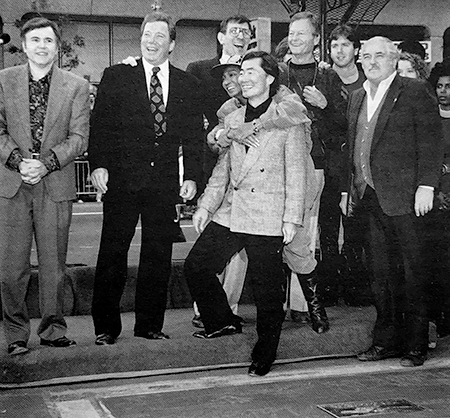 |
 |
| Mann's Chinese Theatre, Hollywood, California. Star Trek 25th Anniversary ceremony, Thursday, December 5, 1991. From left to right: Walter Koenig, William Shatner, Leonard Nimoy, Nichelle Nicholas, George Takei, DeForest Kelley, unknown man, and James Doohan. |
 |
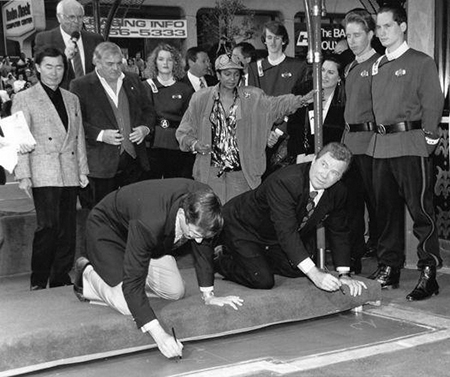 |
 |
| Mann's Chinese Theatre, Hollywood, California. Star Trek 25th Anniversary ceremony, Thursday, December 5, 1991. Master of Ceremonies Johnny Grant is behind George Takei, James Doohan and Nichelle Nichols look on as Leonard Nimoy and Willam Shatner make their marks. |
 |
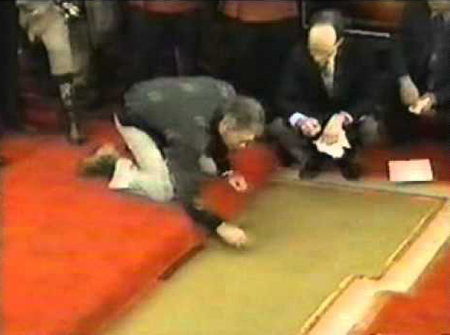 |
 |
| Mann's Chinese Theatre, Hollywood, California. Star Trek 25th Anniversary ceremony, Thursday, December 5, 1991. DeForest Kelley scratches his autograph in the cement. |
 |
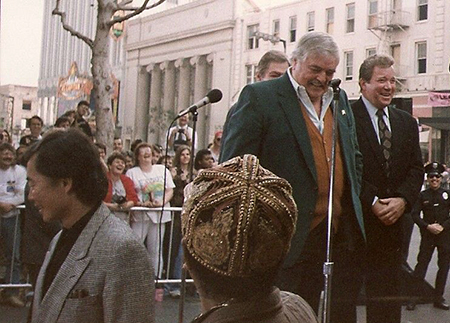 |
 |
| Mann's Chinese Theatre, Hollywood, California. Star Trek 25th Anniversary ceremony, Thursday, December 5, 1991. George Takei and Nichelle Nichols (in hat) look on as James Doohan and William Shatner are up on the dais. |
 |
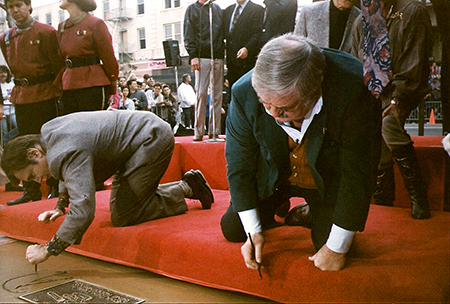 |
 |
| Mann's Chinese Theatre, Hollywood, California. Star Trek 25th Anniversary ceremony, Thursday, December 5, 1991. Walter Koenig and James Doohan make their marks. |
| |
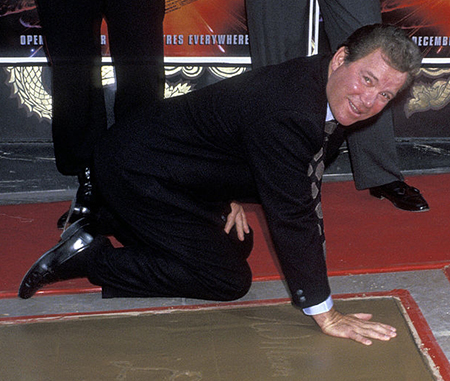 |
 |
| Mann's Chinese Theatre, Hollywood, California. Star Trek 25th Anniversary ceremony, Thursday, December 5, 1991. William Shatner presses his hand only in the cement. |
 |
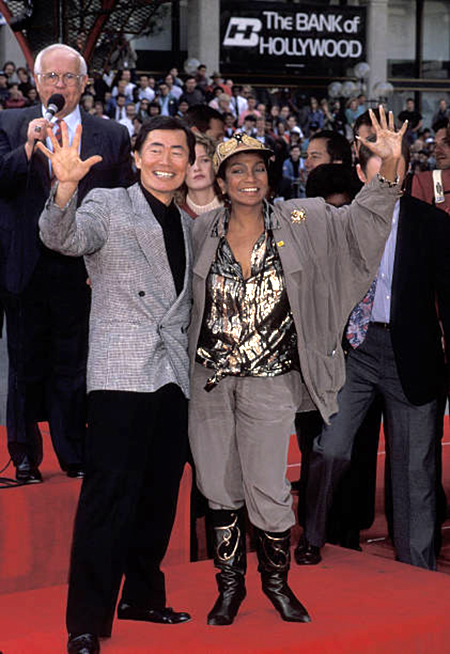 |
 |
| Mann's Chinese Theatre, Hollywood, California. Star Trek 25th Anniversary ceremony, Thursday, December 5, 1991. with Johnny Grant in the background, George Takei and Nichelle Nichols wave to the cameras. |
 |
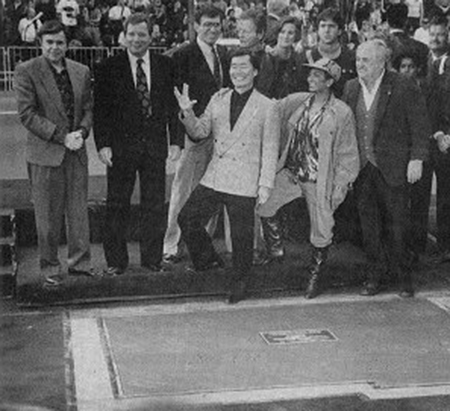 |
 |
| Mann's Chinese Theatre, Hollywood, California. Star Trek 25th Anniversary ceremony, Thursday, December 5, 1991. From left to right: Walter Koenig, William Shatner, Leonard Nimoy, DeForest Kelley, George Takei, Nichelle Nicholas and James Doohan. |
 |
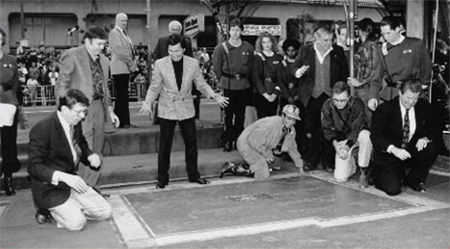 |
 |
| Mann's Chinese Theatre, Hollywood, California. Star Trek 25th Anniversary ceremony, Thursday, December 5, 1991. From left to right: Leonard Nimoy, Walter Koenig, George Takei, Nichelle Nichols, James Doohan, DeForest Kelley and William Shatner. |
| |
|
|
|
 |
|
 |
|
|